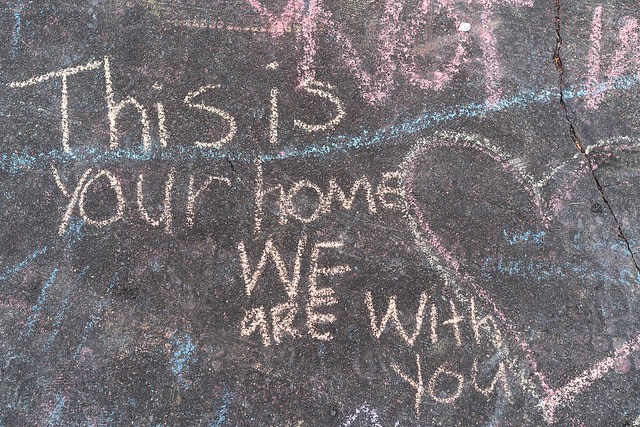
A year ago, my wife and I decided to become citizens of New Zealand. Both of our sons were born here and are full, native Kiwis. It felt odd for our family not to have this in common, and besides, our own connection with New Zealand had grown strong over the happy decade we'd lived here. It was time to take the plunge. Forms were filled in, interviews were held, and we were were notified that our citizenship ceremony would be on the 8th of February, 2018.
On the day, we were ushered into a hall with a podium and rows of slightly uncomfortable stackable chairs. By the time we arrived it was already full of our fellow soon-to-be Kiwis, along with their friends and family. Boisterous children resisted the shushing of their parents, and there was a bit of raucous running up and down the aisles. Nobody minded. The mood was friendly, expectant, and happy. We took our seats next to a young Chinese couple, and behind a family from the UK. Many were wearing splendid traditional dress from their countries of origin - Tongan, Chinese, Thai, Indian. I myself wore a business suit, something I only do under duress. The man in front of me's stiff posture and occasional collar-stretching finger showed I wasn't alone. We were all there with common purpose - because we felt the need for a deeper commitment to our home, and perhaps a deeper sense of acceptance in turn.
A dapper, splendid-mustached gentleman took his place at the podium, and the hall became silent. He began the kind of speech you would expect: a speech of welcome, about the rights and duties of citizenship, about the solemnity of the moment. It was at this point, in that stuffy hall, in the middle of a somewhat monotonous civil ceremony, that I was suddenly aware of a profound connection with the people around me. I felt, with complete clarity, a golden thread linking me to my wife, to the couple next to us, to the gent running the ceremony, extending outwards to everyone in the room. I felt the presence of generations of parents, stretching back in time, working to better the lives of their families, all their individual journeys leading us here, to this hall at this time. Most of all, I felt the presence of our children - all our children, the children in the room and my children, and their children, and their children's children, all joined, facing the unknowable future. This built to a sort of vision: a great, thronging, thrusting, golden river of humanity, meandering over a dark background. All of us together, everyone that has ever lived and everyone that ever will, shining ties binding us together each to each, all pushing ever forward in humanity's common project. For a moment between breaths, I was in touch with something transcendent, cosmically larger than me, yet something of which my own small fleck of personhood was a necessary part.
Afterwards, people congregated in happy, smiling groups, shaking hands and hugging, having their first conversations as full citizens. I slipped out the door at the back of the hall. My wife, who knows me best, followed, holding my hand and laughing with kind-hearted amusement at how moist-eyed and emotional I was.
That moment in the hall came back to me when I first read about the atrocity in Christchurch. I saw again the open, friendly, hopeful faces of my freshly-minted fellow citizens. I felt again the web of love that connects us all in fundamental unity. And I was suffused with an aching and overwhelming grief. Grief for the victims and their families, my countrymen and countrywomen. But grief also that anyone could have a conception of humanity so small, so narrow, and so mean as to lead to an act like this.
In the coming weeks I'll be doing my part in the business of reckoning with our national tragedy, using the tools I have - code, data, and technology. We can do much with these, but we can't go all the way. The real work will be to look again at the human aspect our online communities, which, it has become terrifyingly clear, have become an obstacle to recognising our common purpose.